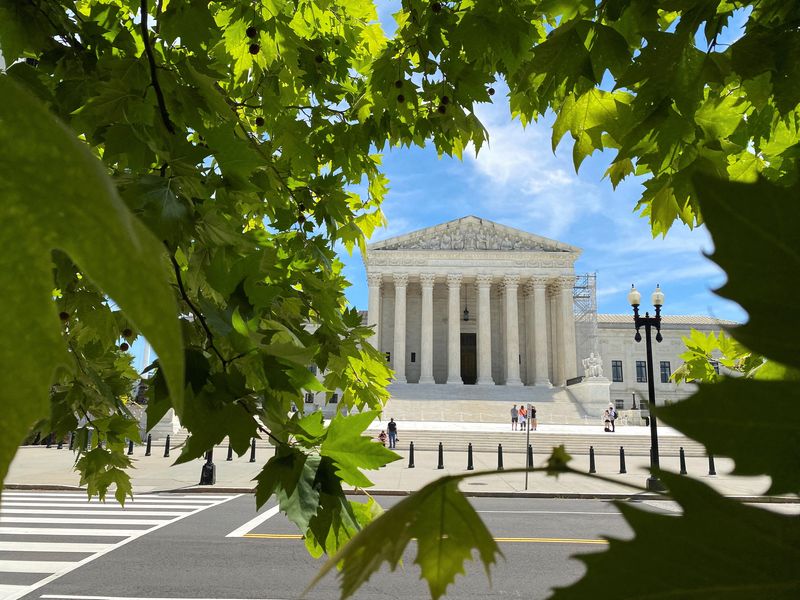By Alexandra Alper and Jody Godoy
WASHINGTON (Reuters) -The U.S. Supreme Court decided on Friday to overturn a 40-year-old legal doctrine used by the federal government to defend some of its regulatory actions in court.
The doctrine, known as " Chevron (NYSE:CVX) deference," had been sharply criticized by businesses.
WHAT IS CHEVRON DEFERENCE?
The doctrine called for judges to defer to federal agency interpretations of U.S. laws deemed to be ambiguous.
The doctrine, among the most important principles in administrative law, arose from a 1984 Supreme Court ruling involving oil company Chevron. Conservatives and business interests had opposed it while liberals, favoring robust corporate regulation, championed it.
WHAT HAS THE SUPREME COURT DECIDED?
The Supreme Court ruled 6-3 on Friday to overturn the doctrine, calling it "unworkable" and saying it is the job of courts, not agencies, to interpret laws.
The court's conservative justices were in the majority, with the liberal justices dissenting.
The case was brought to the Supreme Court by fishing companies who had sought to avoid bearing costs associated with a government-run program to monitor for overfishing of herring off New England's coast. The suit is part of a broader conservative project to strip away regulatory power from federal agencies.
Here are some of the viewpoints the justices considered before their ruling:
THE CHAMBER OF COMMERCE
The U.S. Chamber of Commerce, which represents more than 300,000 businesses, had argued that Chevron deference has let Congress "outsource core policy decisions (particularly controversial ones) to agencies through broadly worded statutes." That has given the agencies, it said, "free rein to enact their own new regulatory requirements through sweeping rulemakings or after-the-fact enforcement actions."
The group said that, in turn, results in "onerous new burdens on businesses."
In one example that is currently in the courts, the Chamber of Commerce sued the U.S. Federal Trade Commission to challenge a new rule barring noncompete clauses in employment contracts. Such rules "often raise major legal and policy questions on which Congress would be expected to have a view, without specific congressional authorization," the Chamber of Commerce said.
The Democratic-led FTC banned the agreements in April, calling the action necessary to rein in the increasingly common practice of requiring workers to sign "noncompete" agreements, even in lower-paying service industries such as fast food and retail. In one well-known example, sandwich chain Jimmy John's agreed to stop enforcing such agreements in 2016.
E-CIGARETTES
E-cigarette manufacturers, distributors and retailers also asked the Supreme Court to rein in Chevron deference. They have accused the U.S. Food and Drug Administration of reaching "far beyond" its legal authority to essentially ban all non-tobacco flavored e-cigarettes, which these companies say have been used by millions of addicted cigarette smokers to transition away from traditional cigarettes.
In a brief, the group asked the Supreme Court to at least limit the scope of Chevron deference "to ensure lower courts properly discern congressional intent and enforce statutory provisions as written."
The FDA initially considered e-cigarettes as having some promise in helping adult smokers transition away from conventional cigarettes, but anti-smoking groups urged the agency to restrict flavored e-cigarettes amid a rise in youth vaping.
DEMOCRATIC SENATORS
Democratic U.S. Senators Sheldon Whitehouse, Mazie Hirono and Elizabeth Warren have issued a full-throated defense of the doctrine, describing it as key in allowing Congress to rely on agency "subject matter expertise" to help carry out the broad policy objectives of lawmakers as U.S. industries grow more complex.

"Administrative regulations reined in dangerous industry activities, and our society became safer and more prosperous," the senators said, describing the bid to overturn the doctrine as "a decades-long effort by pro-corporate interests to eviscerate the federal government's regulatory apparatus, to the detriment of the American people."
The senators also took aim at the "theatricality of the industry-funded campaign" against the doctrine. They cited a dissent written by a judge on the Denver-based 10th U.S. Circuit Court of Appeals who described Chevron deference as the "Lord Voldemort of administrative law," invoking the fictional wizard from the Harry Potter books who is so evil people that are afraid to utter his name.